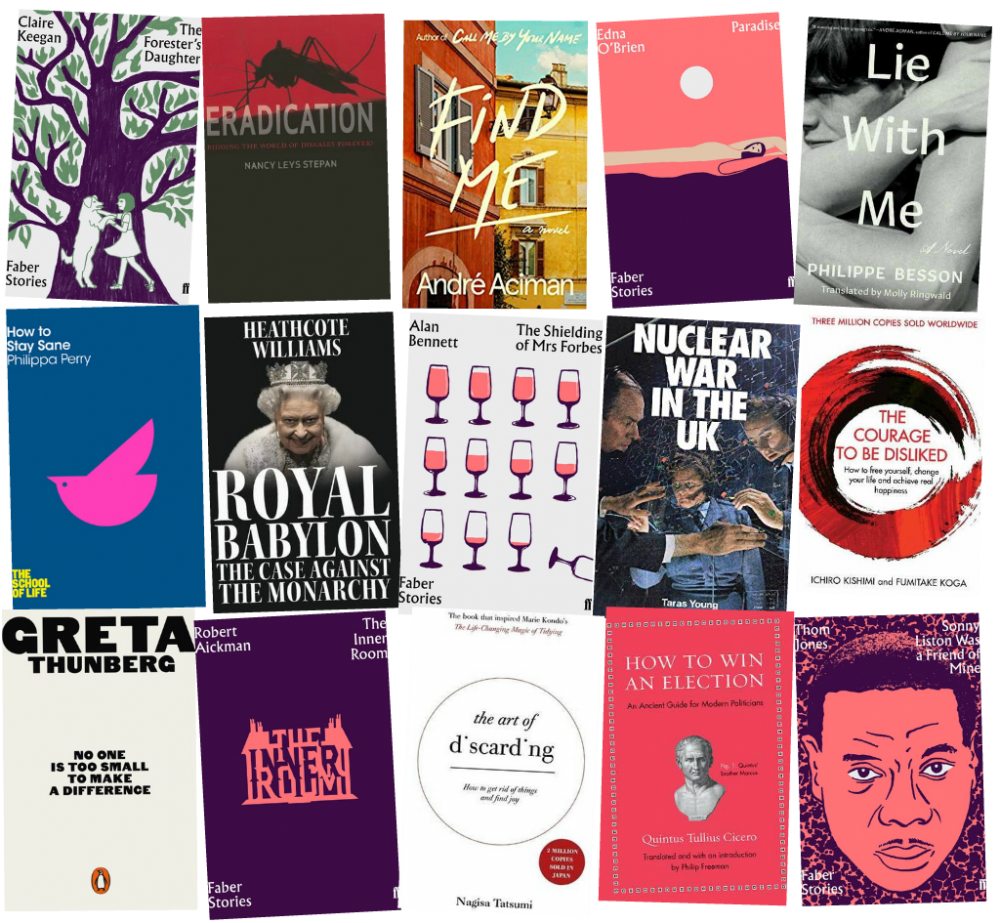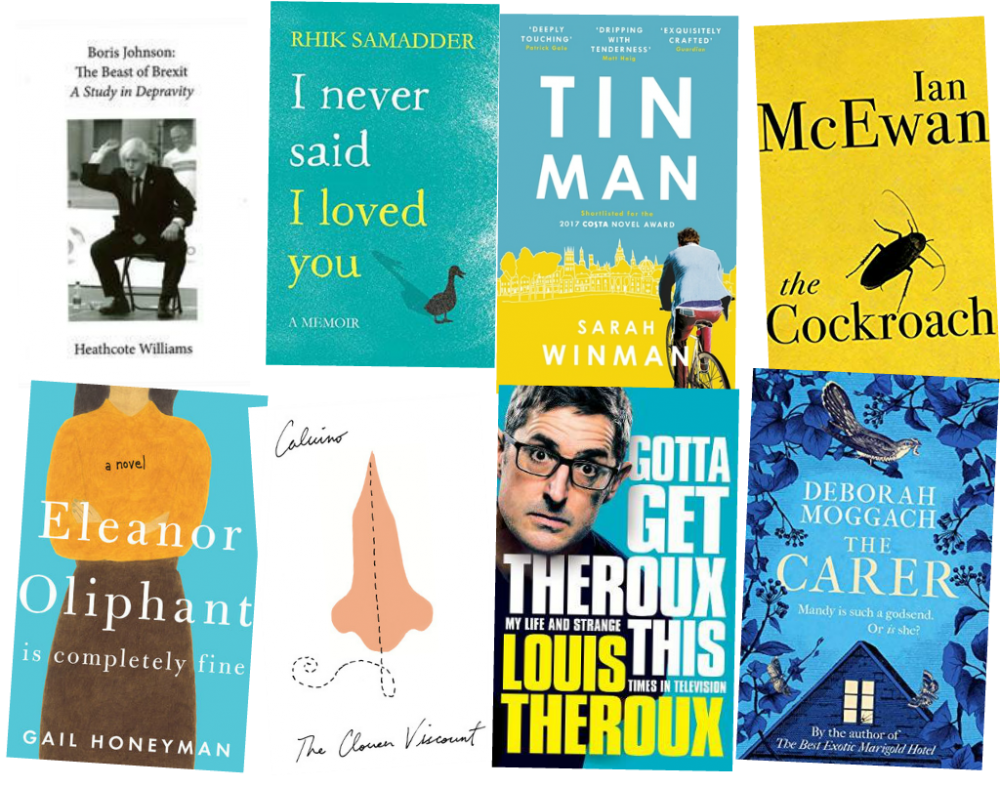What I’ve been reading this month

Molly Ringwald’s translation of Lie With Me, by Philippe Besson, was one of those books which totally disrupted my day as I couldn’t help but read it in a single sitting. The short (148 page) book told the story of an intense romance between two teenage boys in France in 1984. It isn’t completely clear whether it is autobiography or fiction. It was completely transporting, evocative and immersive. By the end, I also found it deeply moving. It left me in a bit of a daze.
Find Me was the sequel to André Aciman’s much-acclaimed Call Me By Your Name (I read that volume in February). It was a rather different book, but no less successful. Find Me was narrated in sections by several of the characters from the original novel at five-year intervals, starting a decade on. The sequel had an altogether gentler, more philosophical tone than the original, which was fitting given that it was written from an adult rather than adolescent perspective. The novel intimately explored a series of romantic relationships, with a interesting musical thread weaved through the book. In all, I thought this was as good as the first book, even if it is very different.
Eradication was Nancy Leys Stepan’s comprehensive history of work to eradicate various infectious diseases, with a unifying thread of examining the life and work of Fred Lowe Soper. Stephan gave a great, sobering illustration of how many attempts at disease eradication have failed for essentially the same reasons. She also gave a balanced account of the dangers of eradication programmes, and in particular the opportunity costs. Stepan sometimes lost me in her discussion of the finer details of some of her examples, but nevertheless convinced me of her central thesis that “eradication campaigns should be exceptional and rare”. This was a great read.
Nuclear War in the UK, by Taras Young, was a bit of a niche title describing the public information campaigns the UK government has run in connection with preparing for nuclear war. It gave a fascinating account of the different approaches used over the years, the reasons that the government chose to adopt these, and the public response. Around half of the book was given over to reproductions of pages from various leaflets and information booklets. I would have liked the content to be extended a little to cover the ‘modern’ attempts at communicating similar info in different circumstances (e.g. 2004’s “Preparing for Emergencies” campaign), but that may have diluted the specificity of the book, and I thought this was great nonetheless.
As we’re in the midst of a general election in the UK, I thought it was a timely moment to read Philip Freeman’s new translation of Cicero’s Commentariolum Petitionis, published as How to Win an Election. This was a letter of no-nonsense advice from Quintus Cicero to his brother Marcus Cicero about how to win the consul election in which he was standing, written in 64BC. Reading this was a little cathartic: for all the many failings of our modern politicians, at least none of our candidates has killed and decapitated the corpse of their brother-in-law. That said, the exhortations for campaigning politicians to make promises they can’t possible keep felt depressingly contemporary (“Broken promises are often lost in a cloud of changing circumstances so that anger against you will be minimal … but if you refuse to make a promise, the result is certain and produces immediate anger in a large number of voters”).
I read the Angus Turvill translation of Nagisa Tatsumi’s The Art of Discarding, a guide to changing one’s relationship with physical “stuff” to avoid accumulating too much. This was music to my ears, as I’m already an anti-hoarder with a strong preference for discarding stuff. The book was a little uncomfortably sexist in places, and could have used a little more emphasis on the environmental aspects of discarding, but I thoroughly enjoyed the slightly smug feeling this book engendered in me.
In 2016, Heathcote Williams published Royal Babylon, a 500-stanza poetic rant about the British Monarchy. I picked this up as last month I enjoyed Williams’s (prose) essay on Boris Johnson. There were similarities between the two in that Royal Babylon also serves as an extended character assassination with many astonishing anecdotes. However, a difference between the two was that the logical argument in Royal Babylon wasn’t clear to me. The book dealt mainly with the character flaws of individual members of the royal family which seemed an odd way to argue for the abolition of monarchy; much as it would be odd for the Boris Johnson book to conclude with a clarion call for the abolition of the post of Prime Minister. Nevertheless, this was an entertaining read.
Philippa Perry used her book How to Stay Sane to set out some simple psychotherapy techniques for maintaining mental health. This was something of an accidental purchase, as I expected a discursive and analytical volume, and got an instructional book of ‘exercises’, none of which I actually did. Nevertheless, while this wasn’t my cup of tea, I appreciated the clean and clear style of writing and the advice within seemed pretty reasonable.
The Courage to Be Disliked by Ichiro Kishimi and Fumitake Koga has, apparently, become something of an Asian sensation. I picked up the English translation, which I think was translated by the original authors, which is the kind of achievement that could make anyone feel inadequate. The book was a sort of philosophical introduction to the psychological teaching of Alfred Adler. I don’t think I’ve read much about Adler’s ideas before, and so I found this exploration interesting. It certainly challenged conventional wisdom, though I can understand why others have rejected it as unhelpfully victim-blaming. The book is presented as a dialogue between a philosopher and a student, and the authors gave a vigorous defense of this approach in the afterword. Nevertheless, I didn’t take to this format, and found it intensely irritating at times. I would have much preferred a more traditional approach with a clearer explanation of the underlying evidence.
No One is Too Small to Make a Difference was an exceptionally poor form of Greta Thunberg’s persuasive arguments on the urgency of tackling climate change. The volume collected eleven short speeches delivered over eight months: as with anyone giving a series of speeches on an identical topics over a short period of time, Thunberg recycled whole paragraphs from speech to speech, making the book highly repetitious. There was no opportunity for Thunberg to air the detail of her arguments, as a short speech will naturally never dive deeper than key headlines. Thunberg is an inspiration; but unfortunately, this book was neither convincing nor satisfying.
I also continued reading the Faber Stories collection of short books this month.
The Shielding of Mrs Forbes was very Alan Bennett, including a rather wonderful line about “a death that might seem to have more to do with narrative tidiness than driving without due care and attention.” It was a story about the complexity of interwoven family secrets which started with a man continuing a clandestine gay affair on his wedding night and only ramped up from there. This was great fun.
The Inner Room was a Robert Aickman short story in which a young girl chose a doll house as a birthday present and creepy things ensure. I’m not quite sure whether I’d class this as “horror” exactly, but it was certainly weird, tense and atmospheric. I enjoyed it, but not sure I’ll remember it twelve months hence.
Thom Jones’s Sonny Liston Was a Friend of Mine was the atmospheric story of a young boxer’s fight. It concentrated mostly on the boxer’s thoughts in the run-up to the event. It had a driving plot and a cleverly building sense of tension, but it’s not really a story that stayed with me or taught me any great lesson.
Paradise, by Edna O’Brien, was a 62-page story in which a young woman had swimming lessons while on holiday with her much older and wealthier lover. It’s main theme seemed to be around the tension between meeting the expectations of self-entitled wealthy people and being one’s own person. This struck me as a little pedestrian, and the characters and scenery weren’t especially memorable. I don’t think this book lived up to the promise of its theme.
Claire Keegan’s The Forester’s Daughter was a kind of domestic drama set in rural Ireland about a woman who married a farmer “for want of someone better”. A dog features heavily, including a few lines which are somewhat bizarrely narrated from the dog’s point of view, but with a heavy dose of anthropomorphism (“His urge to roll in the cow-dung is almost irresistible but this is the type of house where they might let a dog sleep inside.”) This left me unmoved.
This post was filed under: What I've Been Reading, Alan Bennett, André Aciman, Angus Turvill, Cicero, Claire Keegan, Fumitake Koga, Greta Thunberg, Heathcote Williams, Ichiro Kishimi, Molly Ringwald, Nagisa Tatsumi, Nancy Leys Stepan, Philip Freeman, Philippa Perry, Philippe Besson, Robert Aickman, Taras Young, Thom Jones.
